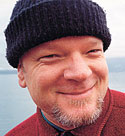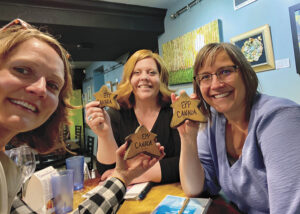I was asked to preach on Earth Day. If I was a typical Mennonite minister, I would start with a few statistics, cite high levels of consumption, touch on some exotic form of injustice that doesn’t implicate us too directly. I’d gently exhort that we’re called to care for creation, be good stewards and drink fair-trade coffee, and then I’d offer a rote prayer for courage and wisdom. If Jesus were in the back of the room during that sermon, he’d be snoring, or, more likely, snorting.
I was asked by a group of radical Christians to preach on Earth Day. Last year, this group engaged in nonviolent civil disobedience; its members held a worship service literally on the street, blocking traffic and breaking the law to make a point about cars and climate change. This year, they were organizing a multi-church worship service and wanted someone to preach.
If I were a typical “radical” Mennonite preacher, I would start with Jesus, show how he was crucified because of his challenge to the power of the authorities, and then strenuously exhort that we should follow in his footsteps and get arrested somewhere doing something. We could trespass on the grounds of a nuclear weapons factory or form a human blockade with indigenous people defending their territory. If Jesus were listening, he’d be heartened by the zeal and amused at the naïveté.
I was asked by a group of radical Christians to preach on Earth Day and to do it as a tent revival preacher. This group of radicals had rented a tent, set it up in front of the provincial legislature, had a choir in blue and gold robes singing old-time gospel songs, and invited three people to give their testimonies.
The stage was set for me. What would I say? This was my hardest sermon ever. It had to appeal to typical Mennonites, radical Mennonites and fun-loving, bike-riding, social-justice, disillusioned-by-mainstream-approaches-to-solving-our-own-problems Mennonites.
I used four sources. For character development, I watched video footage of old-time preachers like Billy Sunday and Elmer Gantry. For authority, I drew upon the gospels, especially where Jesus caused the Pharisees to grumble. For insight, I turned to activist theologian Ched Myers and his “Sabbath Economics” booklet. Finally, for passion, I listened repeatedly to sermons preached by Martin Luther King Jr. in the months before his assassination.
On the night before my big performance, I was forlorn. As I practised the sermon, my words fell flat. I was not a black man leading an oppressed racial group to liberation. I was not a conscientious objector with stories of my transgressions. I was an amateur actor, an armchair rebel, a car-driving hypocrite preaching on Earth Day.
As I took the stage, I was so pumped by the clapping, the piano, the Amens. I called us to consider the Sabbath, to restrain ourselves from over-consumption and to redistribute the abundance of creation to those in need. True to form, we had an altar call and invited people to come forward with pledges to new ways to practise the Sabbath.
It felt sacrilegious for us consumers to have a happy time on Earth Day, but we did. Perhaps that was our radical act. I was inspired by the goodwill of Christians gone astray. Let us continue to pray for forgiveness, and be sincere in our prayers for courage and wisdom.
Aiden Enns welcomes your feedback and ideas. He is a member of Hope Mennonite Church, Winnipeg, and co-editor of Geez magazine. He can be reached at aiden@geezmagazine.org.








Leave a Reply
You must be logged in to post a comment.